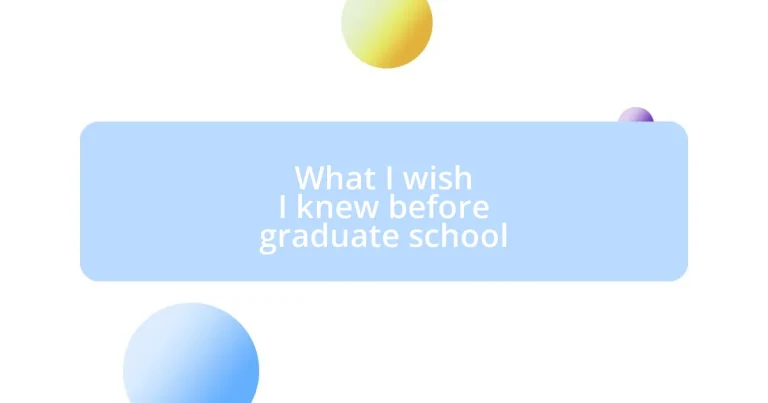Key takeaways:
- Graduate school demands a high level of independence and self-directed learning, with a significant focus on research beyond coursework.
- Choosing the right program that aligns with your interests, faculty expertise, and a collaborative culture is crucial for success.
- Effective financial planning, including budgeting and exploring funding options, can alleviate stress and prepare for unexpected costs.
- Building a supportive network through connections with peers, faculty, and involvement in extracurricular activities enhances the graduate experience and opens doors for future opportunities.
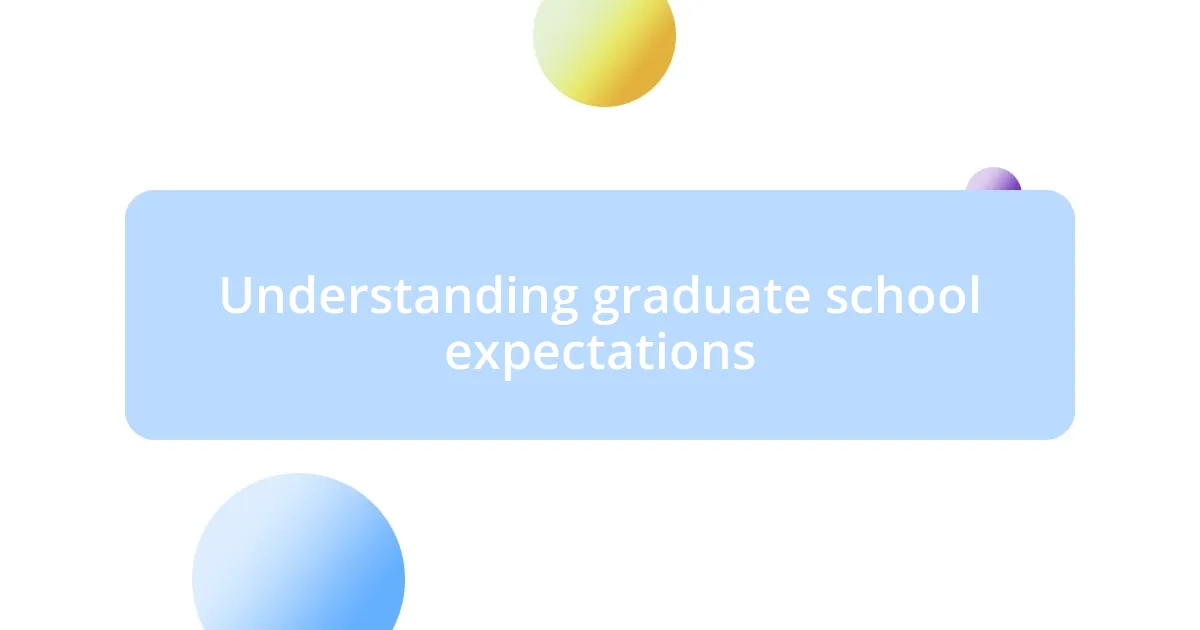
Understanding graduate school expectations
When I first stepped into graduate school, I was utterly taken aback by the level of independence required. I vividly remember sitting in my first seminar, feeling overwhelmed as my peers shared their deep insights while I was still grappling with the basics. Is this what I signed up for? It dawned on me that while classes are essential, diving deep into research and self-directed learning is where the real growth happens.
Another expectation that caught me off guard was the intensity of the workload. I anticipated a heavy reading list, but I never imagined the extent of the side projects and independent studies was just as significant. Have you ever felt like you’re on a treadmill, running but never quite catching up? I often had those moments, especially during finals when I’d spend nights sifting through research articles, wishing I had managed my time better.
Networking also plays a more significant role than I initially realized. Building relationships with professors and peers can be just as valuable as mastering the curriculum. I recall attending a conference feeling out of place, but it eventually opened doors for collaborative projects that enriched my experience. How many of us truly recognize the power of professional relationships until we’re knee-deep in it? It’s a lesson that changed my outlook dramatically.
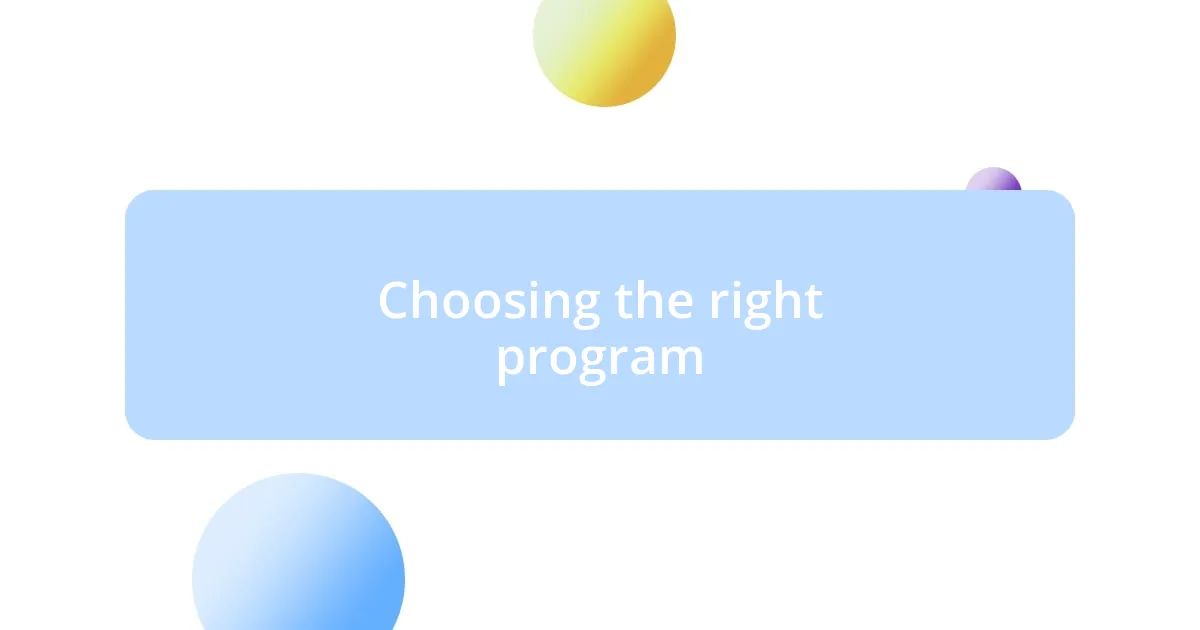
Choosing the right program
Choosing the right graduate program is a pivotal decision that can shape your entire academic journey. I remember the pressure I felt while trying to narrow down my options. At one point, I applied to programs that seemed prestigious on paper but didn’t align with my specific interests. Reflecting on that experience, I now understand how crucial it is to choose a program that resonates with your academic and career goals.
Moreover, it’s essential to consider faculty expertise and research opportunities when evaluating programs. In my second attempt to find the right fit, I spent hours researching professors’ work and reaching out to current students. I remember feeling a rush of excitement when I finally connected with a faculty member whose research aligned perfectly with my interests. That moment solidified my decision to apply, and it ultimately led to a rewarding mentorship.
Lastly, don’t underestimate the importance of the program’s culture. I found myself in what appeared to be a perfect program, but the atmosphere was competitive rather than collaborative. It was a tough lesson for me; I realized that thriving in grad school can depend as much on the environment as on the academics. Trust your instincts and seek out programs where you feel you can truly thrive.
| Aspect | Considerations |
|---|---|
| Program Fit | Aligns with your interests and career goals |
| Faculty Expertise | Research alignment with faculty members |
| Program Culture | Collaborative vs. competitive environments |
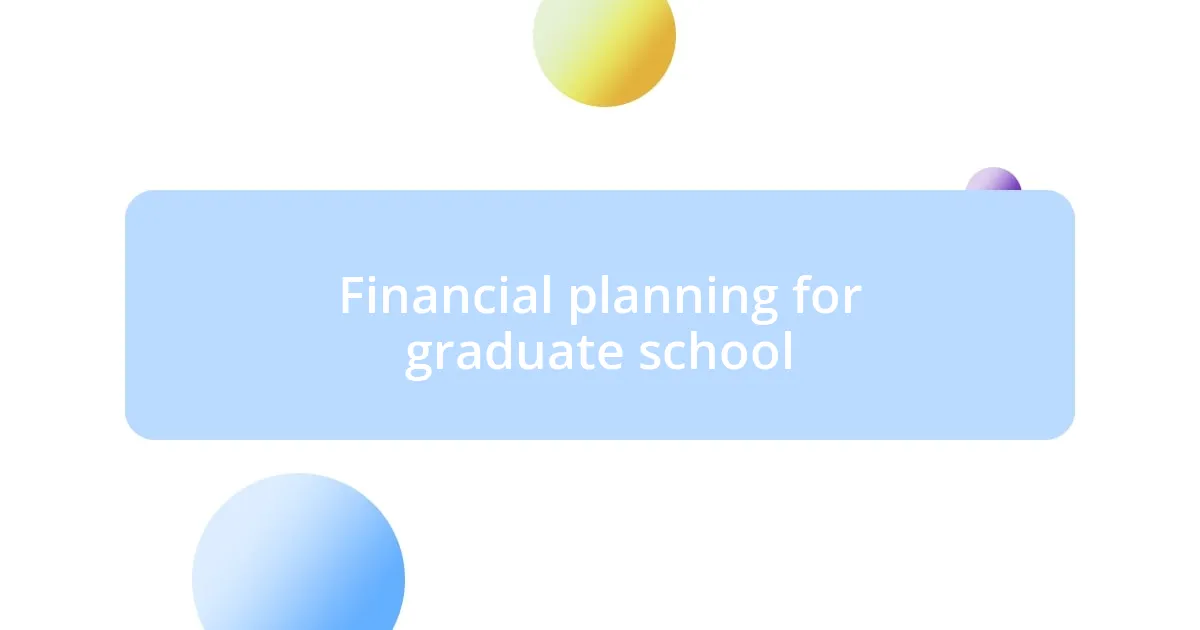
Financial planning for graduate school
Financial planning for graduate school is a crucial yet often overlooked aspect of the journey. From personal experience, I can say that budgeting isn’t just about tracking expenses; it’s about anticipating the unexpected. I learned this the hard way when I faced a sudden tuition increase midway through my first semester, which forced me to scramble for funding options. Taking the time to explore all your financial resources upfront can save you a world of stress later on.
To make things a bit clearer, here are some vital aspects to consider when planning your finances for graduate school:
- Tuition and Fees: Research the total cost of your program, including hidden fees that may not be obvious.
- Living Expenses: Create a realistic budget for rent, food, and transportation in the area where you’ll be studying.
- Funding Sources: Consider scholarships, grants, and assistantships that might be available to you; even a small scholarship can lighten your financial load significantly.
- Loan Options: Understand the different types of student loans and their terms; it’s essential to choose wisely to avoid long-term debt.
- Emergency Fund: Set aside a small emergency fund to cover unexpected costs; it’s a safety net that proved invaluable for me during my studies.
Ultimately, taking these steps can lead to a more manageable and enjoyable graduate experience. If I could offer one piece of advice based on my journey, it would be to stay proactive about your finances; trust me, it pays off in the long run.
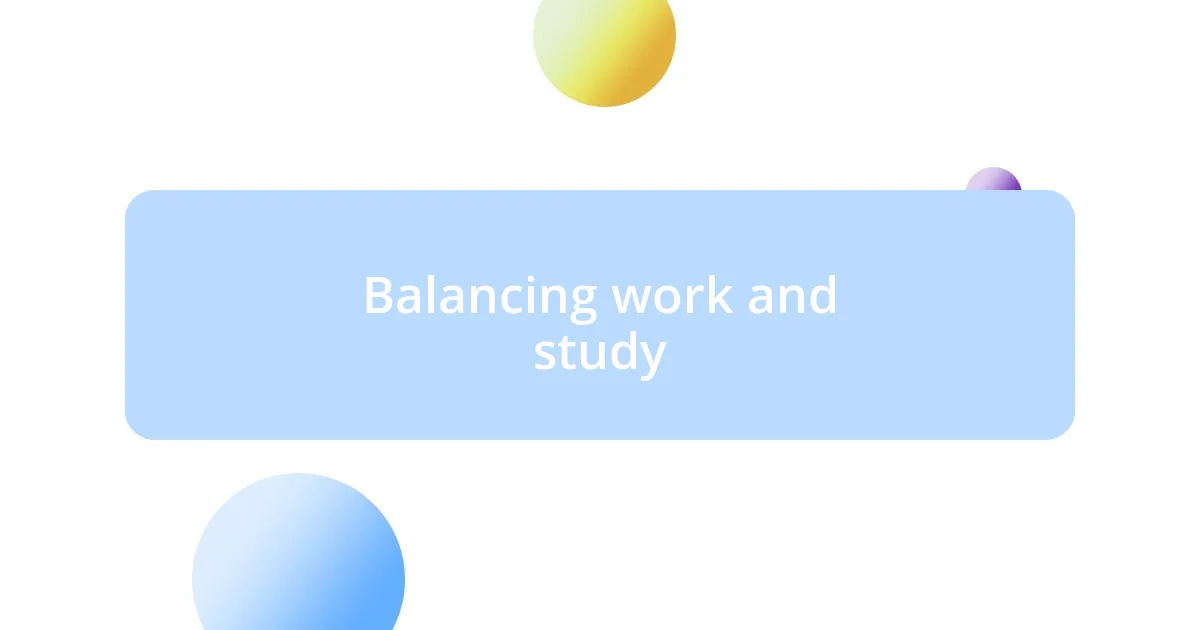
Balancing work and study
Finding the right balance between work and study is often one of the toughest challenges in graduate school. I remember juggling my part-time job alongside a heavy course load, and it often felt like I was walking a tightrope. Sometimes, I’d ask myself: how can I possibly excel in my studies while maintaining my job? The truth is, it requires prioritization and a well-structured schedule to manage both effectively.
In my experience, I found that time blocking was a game changer. By allocating specific blocks of time for studying and working, I created a visual roadmap of my responsibilities. There were days when I could predict I’d need a quieter place to study, so I’d plan my work hours accordingly. Do you ever feel overwhelmed, wondering how to fit everything into your day? Trust me, establishing a routine with clear boundaries between work and studies can provide a surprising sense of control and clarity.
What really helped me was learning to say no. I recall a time when a significant work project came up, and I had exams looming. Initially, I hesitated, fearing I’d let my employer down, but prioritizing my academic responsibilities was ultimately what I needed to do. Setting boundaries and communicating my availability was a vital lesson—one that allowed me to succeed in my studies without compromising my job performance. Balancing work and study is challenging, but knowing when to put your education first can lead you toward achieving your long-term goals.
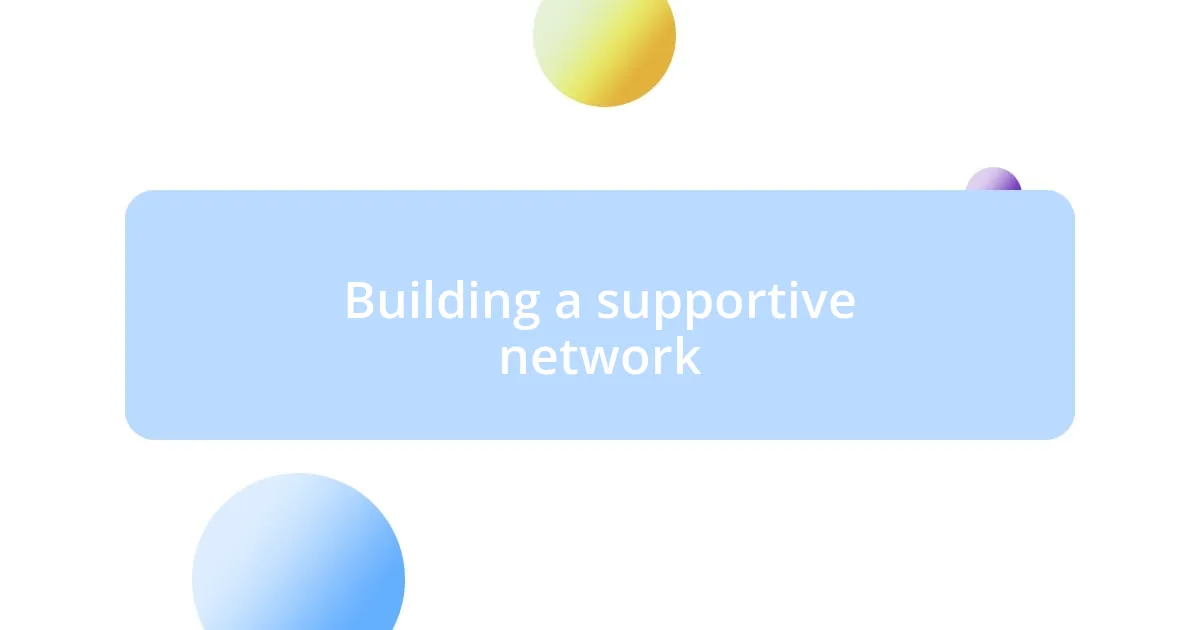
Building a supportive network
Building a supportive network during graduate school can be a game-changer. I vividly recall my first week on campus—feeling like a small fish in a vast ocean. That’s when I made an effort to connect with fellow classmates and faculty members. I quickly learned that having someone to share insights and experiences with can lighten the emotional load. Have you ever felt overwhelmed by the sheer amount of information being thrown at you? It’s so much easier when you have friends to turn to, whether to vent about a tough assignment or celebrate a small victory.
I found that attending networking events and engaging in workshops not only expanded my knowledge but also introduced me to incredible peers who became my study buddies. We organized study groups, which made all the difference during exam periods. I could feel the stress melting away as we exchanged notes and tips. The real beauty is how these connections can lead to mentorship opportunities; there were moments when a simple conversation sparked new ideas or opened doors I hadn’t even considered. Isn’t it amazing how a conversation can sometimes shape your path?
Moreover, getting involved in student organizations helped me cultivate relationships outside of my immediate academic circle. Participating in extracurricular activities not only enriched my graduate experience but also created a sense of belonging. I remember one event where I met an upperclassman who later became a mentor for my thesis project. It made me realize that seeking out connections doesn’t just help academically but can also foster collaborations and friendships that last well beyond graduation. So, how can you start building your own supportive network? Don’t hesitate to reach out—sometimes, all it takes is that first step.
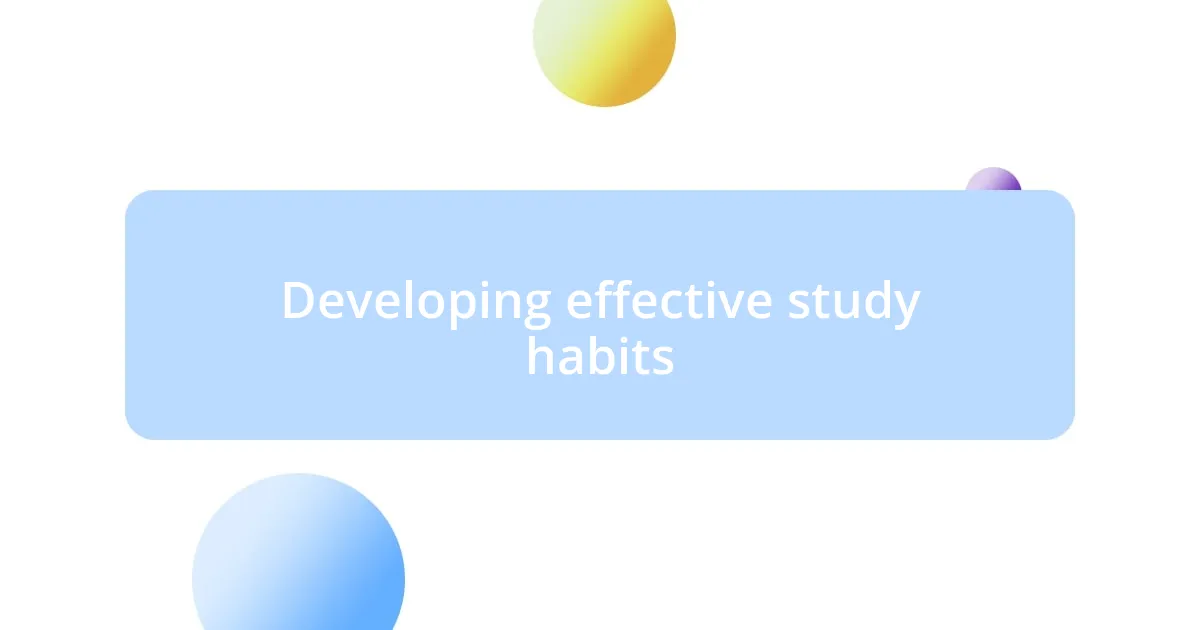
Developing effective study habits
Developing effective study habits is essential for navigating the demands of graduate school. I remember struggling to find a consistent method that worked for me. After a few late-night cram sessions, I realized that studying in short bursts was much more effective than long hours of fatigue. Have you ever noticed how your focus wanes after a while? I found that setting a timer for 25 minutes, followed by a 5-minute break, kept my energy up and my mind sharp. This technique, known as the Pomodoro Technique, truly transformed how I approached my studies.
One thing I underestimated was the importance of the study environment. I always believed I could study anywhere, but I learned the hard way that distractions significantly decreased my productivity. I recall striking a deal with myself: if I went to the library and focused for two hours, I could reward myself with that favorite coffee nearby. The quiet atmosphere and the presence of other diligent students created a motivation I didn’t realize I needed. Have you ever thought about how your surroundings affect your learning? Elevating your study space can make all the difference.
Lastly, I discovered that self-reflection played a vital role in developing my study habits. After completing assignments or exams, I took some time to analyze what strategies worked and what didn’t. It was enlightening to see patterns in my successes and challenges; unfailingly, I found that I retained information better when I engaged with it creatively, like through discussions or teaching others. This strategy not only helped my understanding but solidified my knowledge. What have you learned about your own study habits? Embracing this reflective practice transformed my approach to learning as a whole.
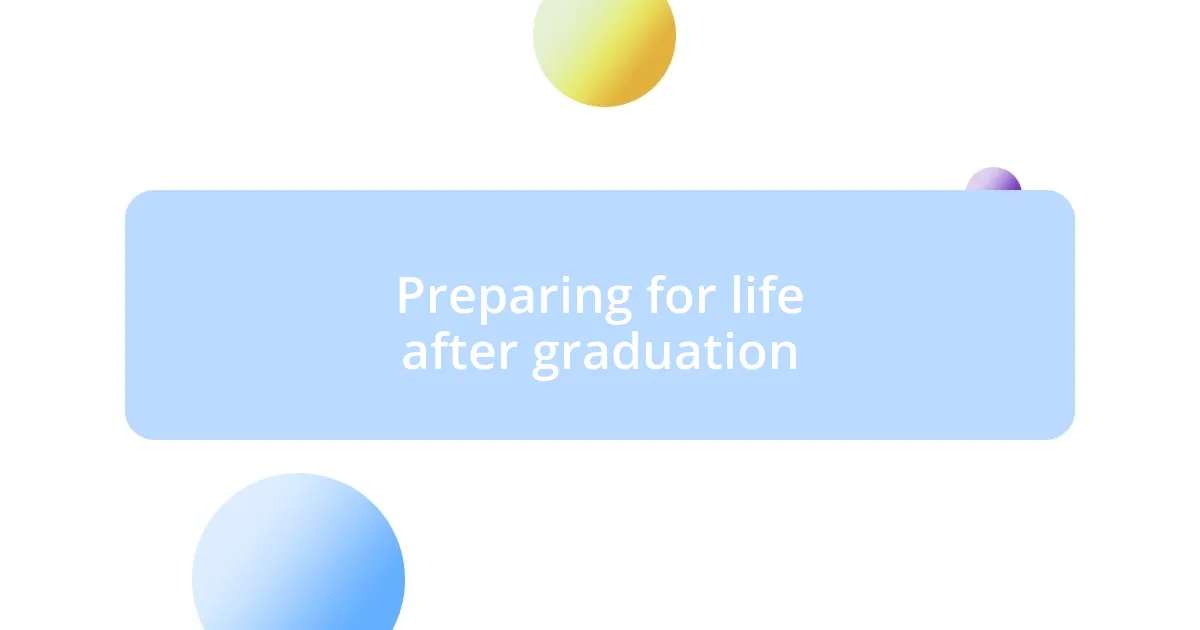
Preparing for life after graduation
Preparing for life after graduation requires intentional planning and a proactive approach. I remember the feeling of uncertainty as I approached my final semester. It hit me one evening while flipping through potential careers—how was I going to turn my academic achievements into a fulfilling job? I realized the importance of starting my job search earlier than I had anticipated. This could mean taking internships or reaching out to alumni for informational interviews. Have you considered how gaining hands-on experience might shape your confidence in the job market?
In my experience, creating a robust resume and a tailored cover letter was non-negotiable. I distinctly recall a workshop where a career counselor emphasized the importance of showcasing transferable skills. It struck a chord with me; I had underestimated how teamwork in group projects and research experience could make me an appealing candidate. Each time I updated my resume, I felt a wave of empowerment as I recognized the value of my unique journey. What skills have you accumulated during your studies that you sometimes overlook?
Networking became a part of my routine well before I graduated. I found myself attending every professional event I could find, often nervously clutching my business cards, contemplating how to approach strangers. One memorable evening, I struck up a conversation with an industry leader who later provided a valuable recommendation for a job I was eyeing. That moment taught me that each connection is an opportunity waiting to unfold. How might a few genuine conversations transform your career prospects? Embracing these opportunities for networking helped me not only land my first job but also develop lifelong relationships that continued to support my professional journey.












